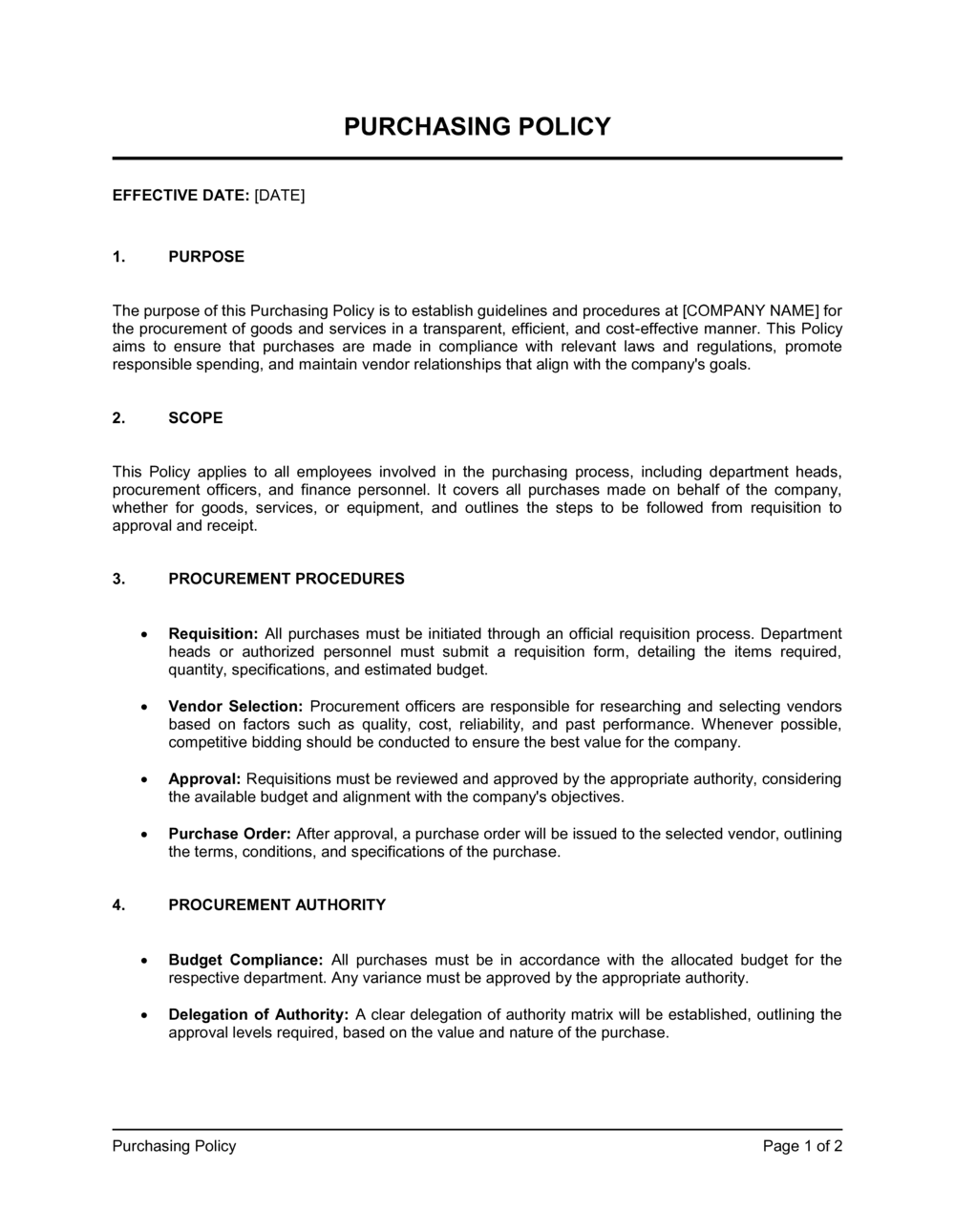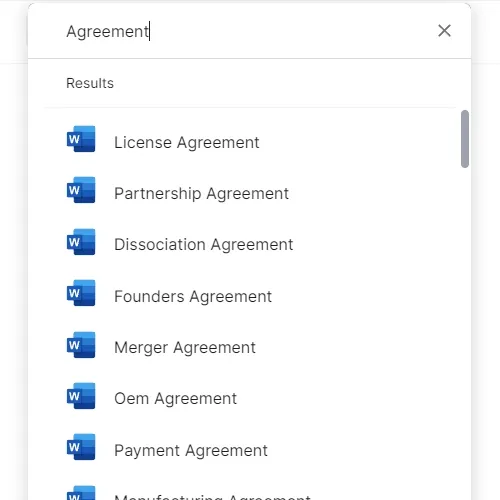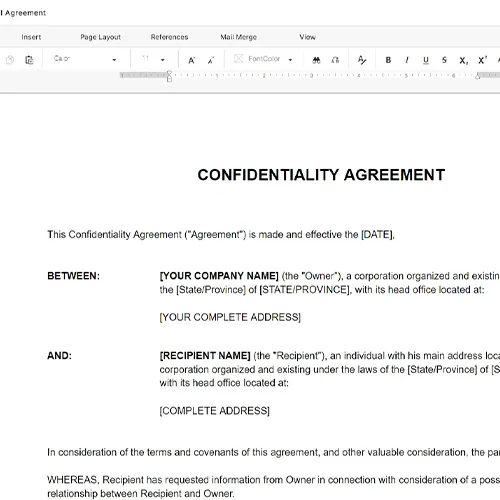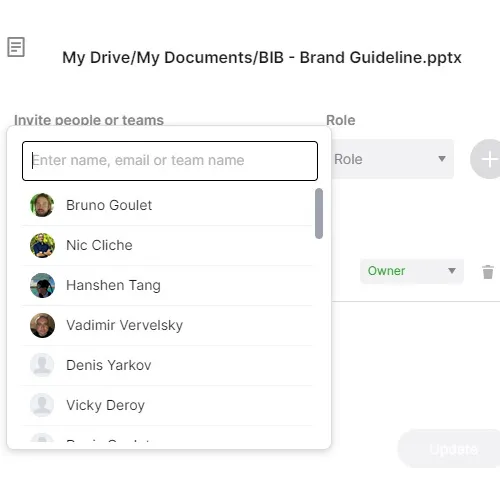Purchasing Policy Template

Understanding a Purchasing Policy
A Purchasing Policy is a critical document within an organization that outlines the standards, procedures, and ethical guidelines for acquiring goods and services. This policy serves to streamline procurement processes, ensure fair and efficient spending of organizational funds, and safeguard the integrity of the purchasing activities. By setting clear guidelines, the policy helps to prevent fraudulent activities and promotes a transparent, accountable purchasing system.
What is a Purchasing Policy?
A Purchasing Policy is a formal document establishing the framework for an organization's procurement activities. It delineates the rules and guidelines for all purchasing transactions, ensuring consistency, transparency, and efficiency in acquiring goods and services. This policy is designed to:
- Purpose and Scope - Clearly articulate the policy's goals, detailing its application across various departments and specifying the types of purchases it governs.
- Authority and Responsibilities - Define who has the authority to make purchasing decisions and outline the specific responsibilities of personnel involved in the procurement process.
- Budget and Approval Process - Establish budget management and spending approval protocols, including detailed thresholds for expenditure levels and requisite authorizations.
- Supplier Selection - Set criteria for choosing suppliers to foster competitive pricing and quality service while ensuring ethical practices are upheld in vendor relations.
- Purchasing Methods - Describe approved purchasing methods, such as competitive bidding, direct purchasing, or through negotiated contracts tailored to different procurement needs.
- Ethical Considerations - Highlight ethical standards to prevent conflicts of interest and promote integrity in purchasing decisions, including regulations on gift acceptance and vendor interactions.
- Documentation and Record Keeping - Mandate the documentation needed for each transaction and the retention of records for auditing purposes, supporting transparency and accountability.
- Quality Control - Provide guidelines for quality assessment and the management of non-compliant goods or services, ensuring value for money and adherence to organizational standards.
- Contract Management - Outline procedures for effective contract management, from negotiation to fulfillment, ensuring compliance with terms and conditions.
- Training and Compliance - Require ongoing training for procurement staff on policy updates and compliance monitoring, reinforcing adherence to internal controls and procedures.
- Review and Update - Specify the frequency and conditions under which the policy will be reviewed and updated, ensuring it remains responsive to changes in the organizational environment and regulatory landscape.
This comprehensive document not only regulates how an organization spends its money but also safeguards its operations against financial risks and enhances its ability to serve its stakeholders effectively.
Supporting Documents for Structuring a Purchasing Policy
To enhance the effectiveness of a Purchasing Policy, integrating related documents is advisable:
- Supplier Code of Conduct - This document sets forth the ethical standards and business practices that suppliers must adhere to when conducting business with the organization, promoting responsible and ethical interactions.
- Procurement Policy - This comprehensive manual delineates the procedures for all procurement activities within the organization, serving as an essential guide for purchasing staff to ensure consistent and effective practices.
- Risk Management Plan - This plan identifies and outlines mitigation strategies for potential risks in procurement processes, including supplier reliability, market price fluctuations, and the potential for fraudulent activities, ensuring organizational resilience.
Why Utilize a Comprehensive Template for a Purchasing Policy?
Implementing a structured template for a Purchasing Policy offers several benefits:
- Standardization - Ensures purchasing activities are conducted consistently and in line with organizational goals.
- Cost Efficiency - Promotes cost-effective purchasing practices that can lead to significant savings.
- Transparency and Accountability - Helps prevent corruption and fraud by establishing clear guidelines and accountability mechanisms.
- Regulatory Compliance - Assures compliance with legal and regulatory requirements, protecting the organization from potential liabilities.
Adopting a comprehensive Purchasing Policy is crucial for any organization that seeks to manage its procurement activities effectively. It not only supports operational efficiency and cost savings but also upholds the ethical standards and accountability essential for public trust and business success.
Updated in May 2024
Reviewed on

Understanding a Purchasing Policy
A Purchasing Policy is a critical document within an organization that outlines the standards, procedures, and ethical guidelines for acquiring goods and services. This policy serves to streamline procurement processes, ensure fair and efficient spending of organizational funds, and safeguard the integrity of the purchasing activities. By setting clear guidelines, the policy helps to prevent fraudulent activities and promotes a transparent, accountable purchasing system.
What is a Purchasing Policy?
A Purchasing Policy is a formal document establishing the framework for an organization's procurement activities. It delineates the rules and guidelines for all purchasing transactions, ensuring consistency, transparency, and efficiency in acquiring goods and services. This policy is designed to:
- Purpose and Scope - Clearly articulate the policy's goals, detailing its application across various departments and specifying the types of purchases it governs.
- Authority and Responsibilities - Define who has the authority to make purchasing decisions and outline the specific responsibilities of personnel involved in the procurement process.
- Budget and Approval Process - Establish budget management and spending approval protocols, including detailed thresholds for expenditure levels and requisite authorizations.
- Supplier Selection - Set criteria for choosing suppliers to foster competitive pricing and quality service while ensuring ethical practices are upheld in vendor relations.
- Purchasing Methods - Describe approved purchasing methods, such as competitive bidding, direct purchasing, or through negotiated contracts tailored to different procurement needs.
- Ethical Considerations - Highlight ethical standards to prevent conflicts of interest and promote integrity in purchasing decisions, including regulations on gift acceptance and vendor interactions.
- Documentation and Record Keeping - Mandate the documentation needed for each transaction and the retention of records for auditing purposes, supporting transparency and accountability.
- Quality Control - Provide guidelines for quality assessment and the management of non-compliant goods or services, ensuring value for money and adherence to organizational standards.
- Contract Management - Outline procedures for effective contract management, from negotiation to fulfillment, ensuring compliance with terms and conditions.
- Training and Compliance - Require ongoing training for procurement staff on policy updates and compliance monitoring, reinforcing adherence to internal controls and procedures.
- Review and Update - Specify the frequency and conditions under which the policy will be reviewed and updated, ensuring it remains responsive to changes in the organizational environment and regulatory landscape.
This comprehensive document not only regulates how an organization spends its money but also safeguards its operations against financial risks and enhances its ability to serve its stakeholders effectively.
Supporting Documents for Structuring a Purchasing Policy
To enhance the effectiveness of a Purchasing Policy, integrating related documents is advisable:
- Supplier Code of Conduct - This document sets forth the ethical standards and business practices that suppliers must adhere to when conducting business with the organization, promoting responsible and ethical interactions.
- Procurement Policy - This comprehensive manual delineates the procedures for all procurement activities within the organization, serving as an essential guide for purchasing staff to ensure consistent and effective practices.
- Risk Management Plan - This plan identifies and outlines mitigation strategies for potential risks in procurement processes, including supplier reliability, market price fluctuations, and the potential for fraudulent activities, ensuring organizational resilience.
Why Utilize a Comprehensive Template for a Purchasing Policy?
Implementing a structured template for a Purchasing Policy offers several benefits:
- Standardization - Ensures purchasing activities are conducted consistently and in line with organizational goals.
- Cost Efficiency - Promotes cost-effective purchasing practices that can lead to significant savings.
- Transparency and Accountability - Helps prevent corruption and fraud by establishing clear guidelines and accountability mechanisms.
- Regulatory Compliance - Assures compliance with legal and regulatory requirements, protecting the organization from potential liabilities.
Adopting a comprehensive Purchasing Policy is crucial for any organization that seeks to manage its procurement activities effectively. It not only supports operational efficiency and cost savings but also upholds the ethical standards and accountability essential for public trust and business success.
Updated in May 2024
Easily Create Any Business Document You Need in Minutes.

Download or open template
Access over 3,000+ business and legal templates for any business task, project or initiative.

Edit and fill in the blanks
Customize your ready-made business document template and save it in the cloud.

Save, Share, Export, or Sign
Share your files and folders with your team. Create a space of seamless collaboration.


